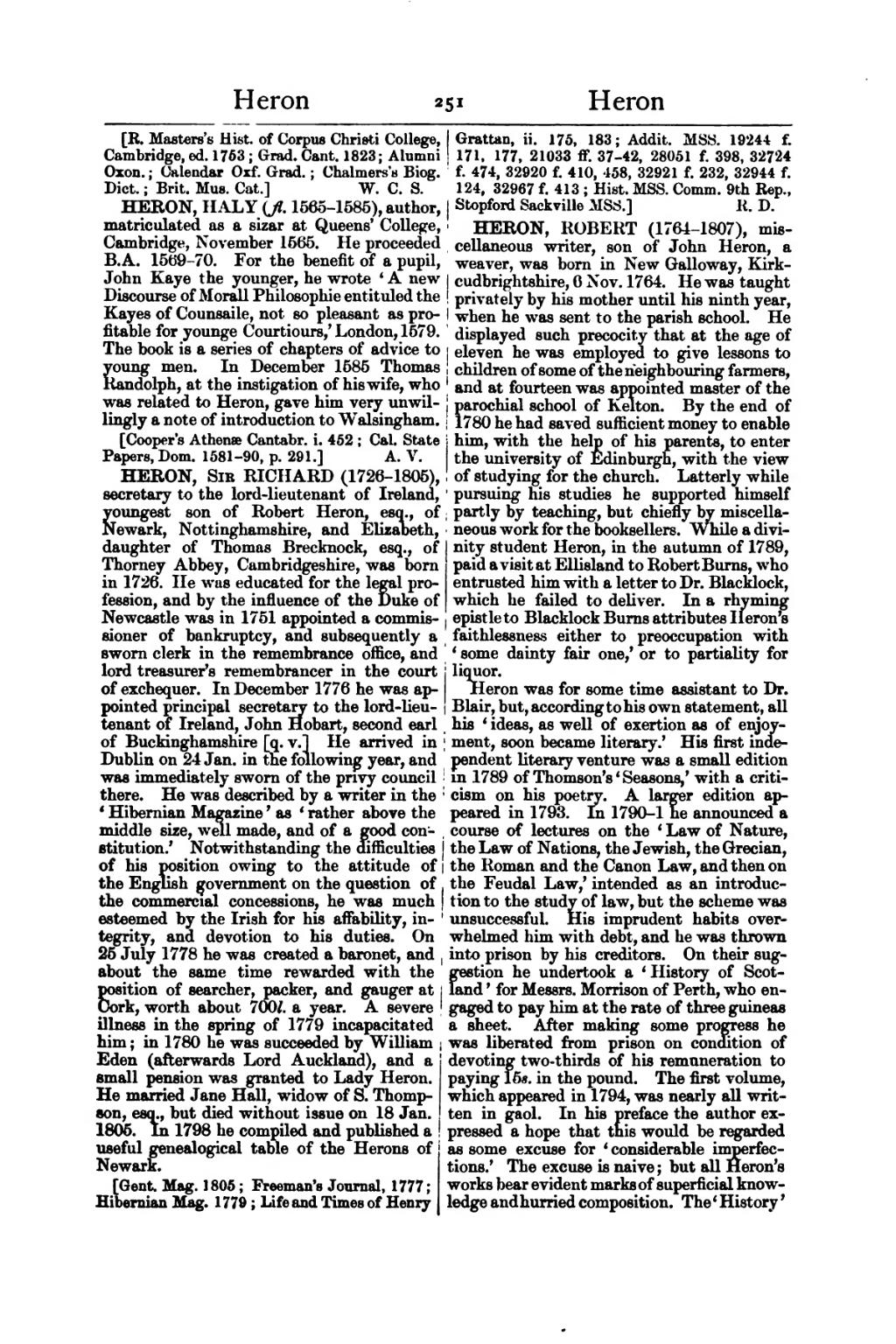[R. Masters's Hist. of Corpus Christi College, Cambridge, ed. 1753; Grad. Cant. 1823; Alumni Oxon.; Calendar Oxf. Grad.; Chalmers's Biog. Dict.; Brit. Mus. Cat.]
HERON, HALY (fl. 1565–1585), author, matriculated as a sizar at Queens' College, Cambridge, November 1565. He proceeded B.A. 1569–70. For the benefit of a pupil, John Kaye the younger, he wrote ‘A new Discourse of Morall Philosophie entituled the Kayes of Counsaile, not so pleasant as profitable for younge Courtiours,’ London, 1579. The book is a series of chapters of advice to young men. In December 1585 Thomas Randolph, at the instigation of his wife, who was related to Heron, gave him very unwillingly a note of introduction to Walsingham.
[Cooper's Athenæ Cantabr. i. 452; Cal. State Papers Dom. 1581–90, p. 291.]
HERON, Sir RICHARD (1726–1805), secretary to the lord-lieutenant of Ireland, youngest son of Robert Heron, esq., of Newark, Nottinghamshire, and Elizabeth, daughter of Thomas Brecknock, esq., of Thorney Abbey, Cambridgeshire, was born in 1726. He was educated for the legal profession, and by the influence of the Duke of Newcastle was in 1751 appointed a commissioner of bankruptcy, and subsequently a sworn clerk in the remembrance office, and lord treasurer's remembrancer in the court of exchequer. In December 1776 he was appointed principal secretary to the lord-lieutenant of Ireland, John Hobart, second earl of Buckinghamshire [q. v.] He arrived in Dublin on 24 Jan. in the following year, and was immediately sworn of the privy council there. He was described by a writer in the ‘Hibernian Magazine’ as ‘rather above the middle size, well made, and of a good constitution.’ Notwithstanding the difficulties of his position owing to the attitude of the English government on the question of the commercial concessions, he was much esteemed by the Irish for his affability, integrity, and devotion to his duties. On 25 July 1778 he was created a baronet, and about the same time rewarded with the position of searcher, packer, and gauger at Cork, worth about 700l. a year. A severe illness in the spring of 1779 incapacitated him; in 1780 he was succeeded by William Eden (afterwards Lord Auckland), and a small pension was granted to Lady Heron. He married Jane Hall, widow of S. Thompson, esq., but died without issue on 18 Jan. 1805. In 1798 he compiled and published a useful genealogical table of the Herons of Newark.
[Gent. Mag. 1805; Freeman's Journal, 1777; Hibernian Mag. 1779; Life and Times of Henry Grattan, ii. 175, 183; Addit. MSS. 19244 f. 171, 177, 21033 ff. 37–42, 28051 f. 398, 32724 f. 474, 32920 f. 410, 458, 32921 f. 232, 32944 f. 124, 32967 f. 413; Hist. MSS. Comm. 9th Rep., Stopford Sackville MSS.]
HERON, ROBERT (1764–1807), miscellaneous writer, son of John Heron, a weaver, was born in New Galloway, Kirkcudbrightshire, 6 Nov. 1764. He was taught privately by his mother until his ninth year, when he was sent to the parish school. He displayed such precocity that at the age of eleven he was employed to give lessons to children of some of the neighbouring farmers, and at fourteen was appointed master of the parochial school of Kelton. By the end of 1780 he had saved sufficient money to enable him, with the help of his parents, to enter the university of Edinburgh, with the view of studying for the church. Latterly while pursuing his studies he supported himself partly by teaching, but chiefly by miscellaneous work for the booksellers. While a divinity student Heron, in the autumn of 1789, paid a visit at Ellisland to Robert Burns, who entrusted him with a letter to Dr. Blacklock, which he failed to deliver. In a rhyming epistle to Blacklock Burns attributes Heron's faithlessness either to preoccupation with ‘some dainty fair one,’ or to partiality for liquor.
Heron was for some time assistant to Dr. Blair, but, according to his own statement, all his ‘ideas, as well of exertion as of enjoyment, soon became literary.’ His first independent literary venture was a small edition in 1789 of Thomson's ‘Seasons,’ with a criticism on his poetry. A larger edition appeared in 1793. In 1790–1 he announced a course of lectures on the ‘Law of Nature, the Law of Nations, the Jewish, the Grecian, the Roman and the Canon Law, and then on the Feudal Law,’ intended as an introduction to the study of law, but the scheme was unsuccessful. His imprudent habits overwhelmed him with debt, and he was thrown into prison by his creditors. On their suggestion he undertook a ‘History of Scotland’ for Messrs. Morrison of Perth, who engaged to pay him at the rate of three guineas a sheet. After making some progress he was liberated from prison on condition of devoting two-thirds of his remuneration to paying 15s. in the pound. The first volume, which appeared in 1794, was nearly all written in gaol. In his preface the author expressed a hope that this would be regarded as some excuse for ‘considerable imperfections.’ The excuse is naive; but all Heron's works bear evident marks of superficial knowledge and hurried composition. The ‘History’
